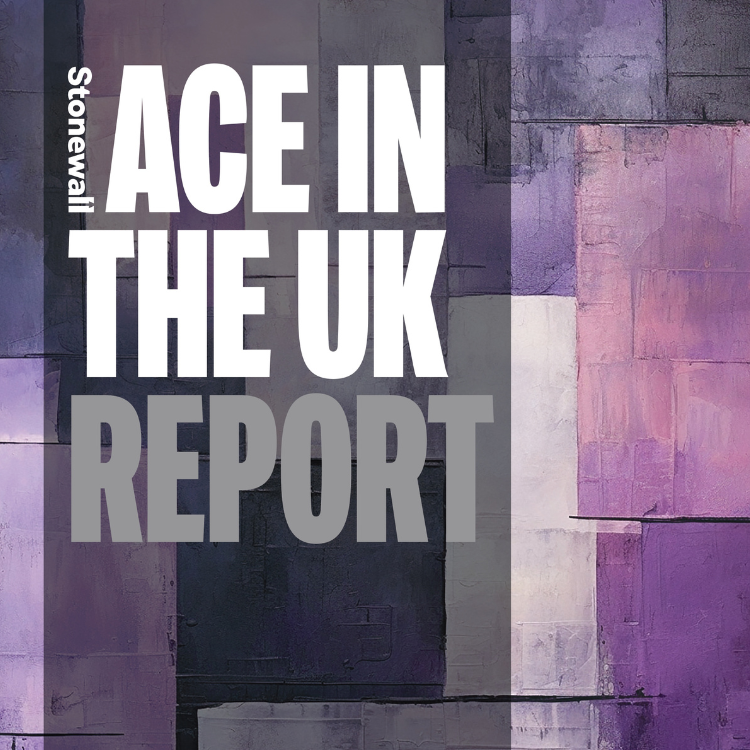
New research: shining a light on ‘dehumanising’ discrimination faced by ace people
- A new report, Ace in the UK, by Stonewall and activist Yasmin Benoit uncovers for the first time the shocking experiences of healthcare, workplace and societal discrimination that ace people face in the UK and the need for better legal and policy protections
- The report reveals that ace people, an umbrella term used to describe people who experience little, fluctuating or no sexual attraction (including asexuality) are less likely to be open about their orientation to friends and family – with analysis of Government data showing that only one in four (26.1%) asexual people are open about their sexuality with friends
- The report highlights that ace people face hostile work and healthcare environments, with experiences ranging from sexual harassment, delays to vital healthcare, and intrusive questions about their sexuality from colleagues and healthcare professionals
- The report’s recommendations include ensuring that asexual people are protected under the Equality Act’s guidance and that ace people’s needs are included in wider LGBTQ+-specific training for healthcare providers.
A new report by Stonewall and Yasmin Benoit – two years in the making – explores in-depth the experiences of ace people when accessing healthcare and at work. Ace people make up between 1-2% of the general population but their experiences are not well understood by the general public. Ace in the UK reveals the alarming lack of understanding that they face throughout society – and the effect that has on their ability to go about their daily lives. The report highlights that, even within LGBTQ+ spaces, ace people are too often overlooked and their concerns ignored.
At work, half of ace people (49%) weren’t out to any colleagues, more than twice the rate of all LGBTQ+ respondents (18%).
And of those who were out, only one in six (17.6%) had a universally positive experience of being out – again half the rate of wider LGBTQ+ respondents (40.8%). With experiences of sexual harassment, disbelief and inappropriate curiosity from colleagues told through our focus groups and interviews, there is a clear need for action on workplace discrimination and harassment.
In healthcare settings, our analysis found that asexual people were around 50% more likely to have never told healthcare staff about their asexuality, with a quarter (24.3%) citing that they were afraid of a negative reaction, and 8.4% citing that they had had a bad experience in the past.
Indeed 18.1% of ace respondents said a disclosure had had a negative impact on their care. Issues in healthcare settings were principally in reproductive health, around smear tests, and inappropriately having their asexuality assessed as a mental health condition.
Amongst a range of recommendations, the report urges the World Health Organisation to end its classification of asexuality as a mental health condition, as it did for homosexuality and trans people, to include asexual people in the Statutory Guidance for the 2010 Equality Act, calls for increased training on supporting asexual people in healthcare settings, and a ban on conversion therapy to attempt to ‘cure’ ace people.
Robbie de Santos, Director of Communications and External Affairs at Stonewall, (he/him) said: ‘This report shines a long-overdue light on the barriers that ace people in the UK face. It’s vital that all LGBTQ+ people are allowed to go about their lives free from discrimination and prejudice. But – as our findings show – there are widespread societal misconceptions of what it means to be ace and how to best support ace people at work and in healthcare settings.
‘We hope that this important project will further people’s understanding of the very real challenges that ace people currently face and we urge political leaders to adopt our recommendations to better support ace people to get their basic needs met and thrive as themselves.’
Yasmin Benoit, Asexual Activist and Researcher, (she/her) said: "The ace community deserves legal recognition. We deserve protection. We deserve acceptance, and we deserve to be heard. With this report, I wanted to dig into the issues facing the ace community today and amplify the voices we never usually hear. This is a much-needed step in understanding what asexuality is, what asexual discrimination looks like and setting the ball in motion for actually doing something about it. It's time that the world paid attention. I'm grateful that I've had the chance to start this project with an accomplished organisation like Stonewall, and to use my platform and education to publish a report that is really going to make a difference."
Focus group participant describing their experience opening up about their asexuality:
‘I've tried to explain to someone that I am asexual, and they said ‘You know, there's something wrong with you. You probably need to pray about it’… I remember feeling inferior about [who I am].”




